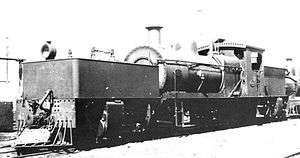Westrail N class
| Westrail N class | |||||||||||||||||||||||||||||||||
|---|---|---|---|---|---|---|---|---|---|---|---|---|---|---|---|---|---|---|---|---|---|---|---|---|---|---|---|---|---|---|---|---|---|
|
N1879 & N1871 at Bunbury Harbour in December 1986 | |||||||||||||||||||||||||||||||||
| |||||||||||||||||||||||||||||||||
| |||||||||||||||||||||||||||||||||
| |||||||||||||||||||||||||||||||||
| |||||||||||||||||||||||||||||||||
The N class was a class of diesel locomotives built by Comeng, Bassendean for Westrail between 1977 and 1979.
History
Eleven were built all for use on the Western Australian narrow gauge network, primarily to haul mineral trains in the south east.[1] Between July 1982 and June 1983, the first four members of the class had their vacuum brake equipment replaced with Westinghouse air brake systems, and were redesignated as the NA class. While liked by crews for their ride quality and power, they suffered from reliability problems and most were withdrawn in the early 1990s. The last were withdrawn in 1997.[2][3][4]
In January 1995 two of the NA class were converted to standard gauge using bogies from Mount Newman Alco M636s, and redesignated as the NB class. In February 1998 these two were sold to Austrac Ready Power, Junee.[2][5] These were sold in 2004 to Patrick Port Link, Adelaide and again in September 2011 to Australian Locolease who redesignated as the 18 class and leased them to El Zorro for use in Victoria.[6][7][8]
Austrac also purchased NA1874 but it was sold without use to South Spur Rail Services in 2001 and converted for standard gauge operation in January 2006. It was scrapped in 2014.[2][6][9][10]
Status table
| Loco No | Revised No | Builders No | Entered Service | Status |
|---|---|---|---|---|
| N1871 | C-6099-01 | 05 Dec 1977 | Converted to NA1871 1982 | |
| NA1871 | 29 Dec 1989 | Scrapped 1994 | ||
| N1872 | C-6099-02 | 20 Aug 1977 | Converted to NA1872 1983 | |
| NA1872 | 16 Jun 1983 | Converted to NB1872 1994 | ||
| NB1872 | Sep 2011 | Renumbered to 1872 2011 | ||
| 1872 | Jan 1995 | Stored South Dynon Locomotive Depot[6] | ||
| N1873 | C-6099-03 | 17 Nov 1977 | Converted to NA1873 1982 | |
| NA1873 | 09 Nov 1982 | Converted to NB1873 1994 | ||
| NB1873 | Dec 1994 | Renumbered to 1873 2011 | ||
| 1873 | Sep 2011 | Stored Islington Railway Workshops[6] | ||
| N1874 | C-6099-04 | 30 Nov 1977 | Converted to NA1874 1982 | |
| NA1874 | 15 July 1982 | Scrapped 2014[6] | ||
| N1875 | C-6099-05 | 15 Feb 1978 | Scrapped 1994 | |
| N1876 | C-6099-06 | 09 Aug 1978 | Scrapped 1997 | |
| N1877 | C-6099-07 | 27 Sep 1978 | Scrapped 1997 | |
| N1878 | C-6099-08 | 22 Dec 1978 | Scrapped 1994 | |
| N1879 | C-6099-09 | 22 Dec 1978 | Scrapped 1994 | |
| N1880 | C-6099-10 | 10 Jan 1979 | Scrapped 1997 | |
| N1881 | C-6099-11 | 26 Jun 1979 | Scrapped 1994 |
References
- ↑ Dunn, John (2010). Comeng: A History of Commonwealth Engineering Volume 3: 1967-1977. Kenthurst: Rosenberg Publishing. pp. 215–219. ISBN 9781877058905.
- 1 2 3 Westrail N / NA / NB classes Westrail Alcos 9 March 2002
- ↑ Oberg, Leon (2008). Locomotives of Australia: 1850s-2007. Sydney: Rosenberg Publishing. p. 383. ISBN 9781877058547.
- ↑ N Class (WA, diesel) Railpage
- ↑ "Westrail Motive Power Coming and Going" Railway Digest April 1998 page 14
- 1 2 3 4 5 "Australia Wide Fleet List 2014" Motive Power issue 96 pages 65, 67
- ↑ NB Class (WA, diesel) Railpage
- ↑ 18 Class Vicsig
- ↑ NA Class (diesel, South Spur) Railpage
- ↑ 1874 Vicsig
External links
![]()

